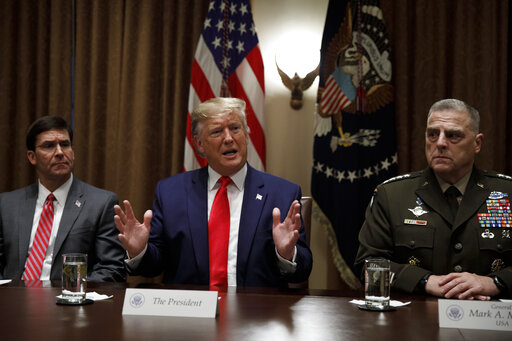
US President Donald Trump, joined by Defense Secretary Mark Esper and Chairman of the Joint Chiefs of Staff Gen. Mark Milley, speaks during a briefing with senior military leaders at the White House on October 7, 2019. (Photo: AP)
Washington (People’s Daily) - As Turkey pushed ahead with airstrikes and artillery fire against Kurdish forces on Wednesday, an increasing Turkish military assault on northeastern Syria plus rising casualties are sharpening domestic calculations US President Donald Trump made in abandoning his allies in the fight against IS.
Republican and Democratic lawmakers in Washington warned that Turkey's advance would target the Kurds, a US regional ally, while also benefiting IS and adversaries Iran and Russia, who are involved in the Syrian war.
Trump’s decision was met with unusual bipartisan outrage. Republican Senator Lindsey Graham and Democrat Senator Chris Van Hollen introduced a bipartisan bill aimed at sanctioning Turkey for its “invasion of Syria.” Lawmakers lambasted Trump’s move, and bipartisan support is expected for a veto-proof majority in the Senate.
Democratic head of the House Intelligence Committee Adam B. Schiff said they would examine Trump’s decision while describing it as “impulsive and dangerous.”
Schiff noted the committee regularly focuses on the region, IS threats, the position of US troops, Kurdish allies, and tensions involving Turkey.
“We will be poring over the intelligence to determine what steps Congress might need to take to protect American interests in light of this reckless action by the president,” Schiff said, adding that this would be pursued “as part of our oversight responsibility.”
"He took an oath of office to protect the nation against all enemies, foreign and domestic. There's no bigger enemy to our nation than ISIS," GOP Senator Lindsey Graham of South Carolina, who is generally a key Trump ally, told reporters.
"And there's no way we can protect the country from radical Islam without partners like the Kurds," the Republican lawmaker asserted.
House Republican Lee Zeldin, a staunch presidential ally tweeted Monday, “The Kurds have fought, bled & died fighting alongside the US. They have been warriors & brothers in battle along the way. POTUS is right to want to end endless wars, but the Turks wiping out the Kurds will ABSOLUTELY NOT be an acceptable outcome after all of that.”
Other US lawmakers claimed Trump's decision to withdraw troops was a "weak move" that is "not making us safer,” but serves as an example of Trump's from-the-gut "America First" foreign policy decision-making style.
In keeping his promise, while in office for nearly three years, Trump has shown persistence in honoring campaign trail vows. Whether it’s pulling out of the Paris Agreement, the Iran nuclear deal or defying Congress to fund the border wall, he has often flouted official advice and alienated himself from much of the rest of the world. Trump knows his viability rests on his core group of grassroots supporters who he will never disappoint.
CNN commented that, for Trump foreign policy is not a matter of national interest or an extension of American exceptionalism. It's a tool for personal political advancement. No one can say Trump tries to conceal it.
In many ways, Trump's Syria policy is typical of his national security decision making based on how it unfolded in confusion, led him to contradict previous statements that caused his subordinates to produce after-the-fact coherence on the situation. The world's sole superpower has abandoned its historic role as guarantor of global stability and its foreign policy values.
The Wall Street Journal said Trump’s stance on Syria has drawn widespread denunciation from some of his strongest Congressional supporters, from former military commanders who oversaw the fight against IS to diplomats worried about US ability to find partners when the next major global crisis arises. European allies also voiced concern.
Observers also concerned with Turkey’s military offensive against US-backed Kurdish forces in Syria opens an uncertain chapter in Washington’s Middle East policy as Trump willingly cedes influence to Ankara and other regional players.


